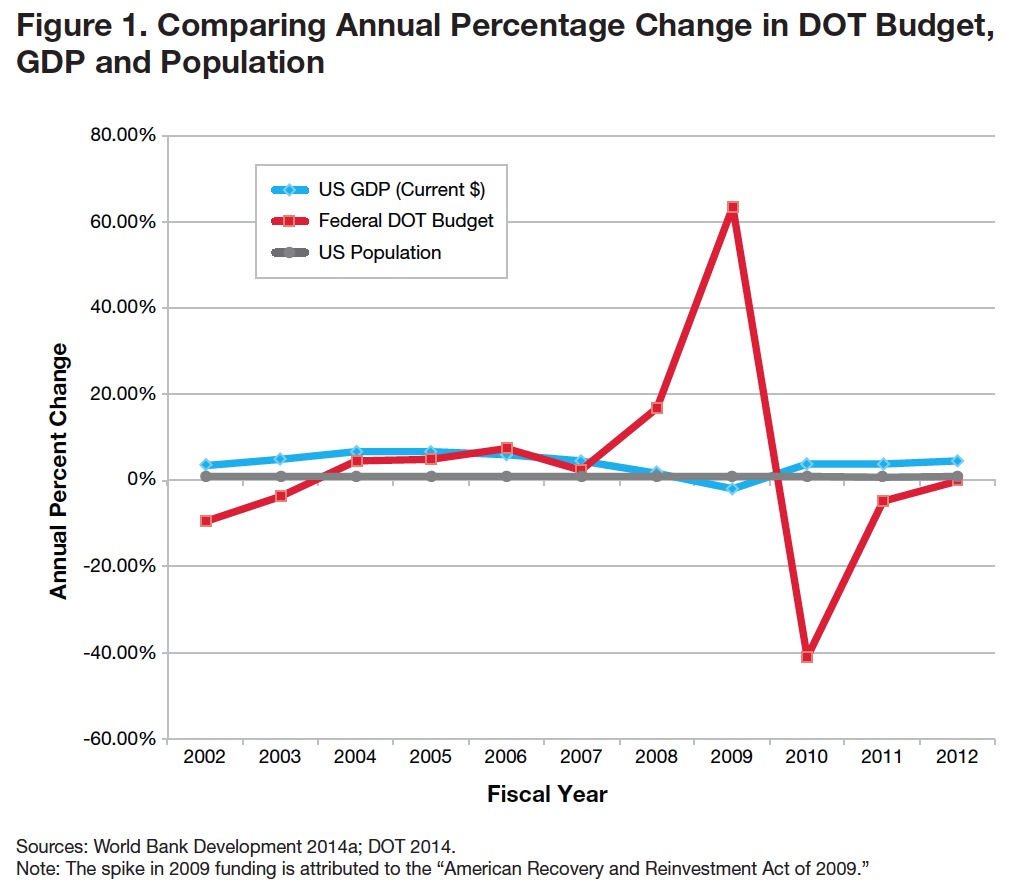DUKE CENTER ON GLOBALIZATION, GOVERNANCE & COMPETITIVENESS
Executive Summary
Federal investment in transportation infrastructure can drive employment and boost our national competitiveness. Increased investment in transportation infrastructure will provide jobs in many sectors, including in construction and manufacturing, while addressing the long-term deficiencies in the state of U.S. infrastructure. Businesses depend on a state-of-the-art transportation infrastructure to efficiently transport necessary components and final goods to their destinations. A safe, world-class transportation infrastructure can create new jobs through greater efficiency, increased competitiveness, and more overall demand.
However, Congress and the President continue to delay making long-term, meaningful decisions about investing in our critical infrastructure. In July 2014, Congress approved an $11 billion “patch” to the Highway Trust Fund, effectively postponing any meaningful decisions until May 31, 2015. Unfortunately, this is not a new approach for Congress. After enacting SAFETEA-LU in 2005 (the previous bill authorizing transportation spending), Congress passed nine short-term extensions before finally authorizing MAP-21 in 2012, which budgeted $105 billion for surface transportation investment. That authorization expired in 2014, creating uncertainty for transportation planners and states looking to tackle major projects.
A paucity of new investment and a piecemeal policy approach have led to severe consequences. Our decaying infrastructure is creating a significant drag on the economy: 156,000 deficient bridges, an investment backlog of $85.9 billion for our nation’s roads, and $200 billion annually in lost economic activity from inefficient rail transportation.
This report evaluates the cost of inaction through the lenses of international competitiveness and job creation. This report finds:
- Old and broken transportation infrastructure makes the United States less competitive than 15 of our major trading partners and makes manufacturers less efficient in getting goods to market.
- Underinvestment costs the United States over 900,000 jobs, including more than 97,000 American manufacturing jobs.
- Maximizing American-made materials when rebuilding infrastructure has the potential to create even more jobs. Relying on American-made inputs can also mitigate safety concerns related to large-scale outsourcing.
A six-year transportation bill of at least $100 billion annually would support upwards of 2.18 million American jobs and rebuild our underperforming infrastructure. It would also make America more competitive, supporting the basic needs of U.S. businesses and their workers.
Download full version (PDF): Infrastructure Investment Creates American Jobs
About the Duke Center on Globalization, Governance & Competitiveness
www.cggc.duke.edu
The Center on Globalization, Governance & Competitiveness (CGGC), an affiliate of the Social Science Research Institute at Duke University, is built around the use of global value chains methodology to study the effects of globalization on various topics of interest including: industrial upgrading, international competitiveness, the environment, global health, engineering and entrepreneurship, and innovation in the global knowledge economy.
Tags: Duke Center on Globalization, Duke University, Governance & Competitiveness







 RSS Feed
RSS Feed